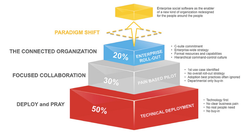Relevant Overviews
- Communication Strategy
- Online Strategy
- Online Community Management
- Social Media Strategy
- Content Creation & Marketing
- Digital Transformation
- Change & Project Management
- Innovation Strategy
- Communications Tactics
- Psychology
- Productivity
- Social Web
- Politics
- Communications Strategy
- Science&Technology
- Business
Overview: Digital Transformation
Digital transformation is an over-used, over-abused term. Here’s what it means to me.
From many strategies ...
In most organisations, the following strategies are barely on speaking turns, let alone fully integrated and mutually supportive:
- Internal communication: Every day, valuable ideas and information pour into your organisation as staff engage with stakeholders and discover useful knowledge online. But what happens then? If a piece of knowledge is valuable to them, it's probably also useful to their colleagues ... so why does so little of it circulate within your organisation?
- Internal collaboration: Are your staff still emailing documents to each other, and spending hours tracing the latest version and integrating changes?
- Knowledge management: Can your staff find the knowledge they need efficiently, share information effortlessly without flooding everyone’s Inboxes, and serendipitously discover relevant information around the digital equivalent of the office watercooler?
- External communication: There is no better advocate for any organsation than empowered staff and engaged audiences. Have you transformed your workforce into Social Ambassadors, and launched communities to engage your customers and stakeholders in co-defining the future?
- Training and employee engagement: Even if you have the tools, can your staff use them? Do they know why they should?
... to one strategy: build an internal innovation community
How can you integrate the above strategies, processes and tools? By treating them as different aspects of one, overarching goal: the creation of an internal innovation community throughout your organisation.
everyone is trained and motivated to share knowledge internally and externally, supported by efficient tools and processes
The idea is to frame the above strategies, processes and tools as interconnected tactics within an overall strategic framework. This aligns them to a shared set of goals: an organisation where everyone is trained and motivated to share knowledge internally and externally, supported by efficient tools and processes for knowledge management, internal and external communications.
From Strategy to Implementation
Having such a strategy is all very well, but noone will notice if you never implement it. You'll need to plan for unknowns, coordinate experts who have never worked together before, and integrate project and change management so that:
- change rolls out with the new features, tools and processes,
- these are developed with your staff, not foisted upon them.
I’ve specialised in the intersection of internal and external communications, collaboration and knowledge management since 1995. If you need help, get in touch.
More services: start with Communication strategy.
Relevant resources

becoming a learning organization was nothing like winning a marathon ...cultivating an award-winning orchard... nurturing systems and culture to produce meaningful results... We embarked on a systematic and phased approach to cultivating the organization we all wanted.

as CEO... your power and privilege leave you insulated... from information that might challenge your assumptions and allow you to perceive a looming threat or opportunity. Ironically, to do what your exalted position demands, you must in some way escape your exalted position... at firms that are highly successful innovators, leaders are especiall…

An effective communications strategy must be connected to other strategies, usually managed by different departments. Reframing it as central to your organisation’s innovation strategy helps sidestep turf wars.

What happened when I was invited to “do a Rápido” at the IABC’s conference in Rotterdam earlier this week.

"If you’re embracing online collaboration as a necessary evil — the only way to work with an increasingly dispersed team of global or remote workers, for example — then you’re doing it wrong. Online collaboration is not a second-best substitute for face-to-face work: It’s a complement with its own perks and benefits." - Collaborating Online Is So…

"most digital transformation deployments fall into the 'deploy and pray' category, a minority address known pain points and use cases, whilst only about 20% of projects involve a concerted organisation-wide roll-out aimed at creating a connected company. ... paradigm shift is needed to go beyond just adopting social technologies towards creating a…
Interesting ruminations on the limits of traditional knowledge mgt techniques. "the everyday experiences we have do not exist in a meaningful way in any documents. What has happened can seldom be understood from the Excel sheets explaining the results of our actions or the Word-documents explaining what we did or what we should have done." - Wh…

A timely and interesting article... "Gossip is an effective way of achieving these goals in an unhealthy social system. People engage in gossip when they lack trust or efficacy. We become consumers of gossip when we don’t trust formal channels... We become purveyors of it when we feel we can’t raise sensitive issues more directly... The problem w…

"On the surface, no single factor seems to set Slack apart from a plethora of other collaboration tools. However, a closer look using the model described the book Hooked: How to Build Habit-Forming Product, reveals the user psychology behind the company's success." - The Psychology of a Billion-Dollar Enterprise App: Why Is Slack So Habit-Formi…

"Traditional intranets required someone at the helm with a broad perspective and variety of skills. Newer social intranets, with their greater ability to influence company culture and productivity, have only added to the pile of needed skills. In this article we explain what the core skills are for successful intranet managers, common gaps in exp…

"We couldn't understand why people without technical knowledge had to tell programmers "what" to do and, furthermore, they had to supervise "how" programmers did it." At last. Someone said it. And also quite a bit more about the timesucks that are meetings, email and commuting. These guys avoid all of them, work 4 days/week and are growing …
'Innovation' threaded its way through a lot of the resources added to my TumblrHub last week: from innovation-friendly management through to innovative Content Management Systems for tomorrow's newsmedia business models and personal productivity tools.
"Employees don't want to be "satisfied" as much as they want to be engaged. What they want most is a great boss who cares about their development, and a company that focuses on and develops their strengths." - Employee Satisfaction Doesn't Matter | LinkedIn

"Internal communications are responsible for engagement, which can enable employees to actively play a part in shaping the values and the type of experience customers have. Engaged employees who have been inspired and experience the vision, values and mission will then be strong advocates as they work and become involved in the brand themselves…
"Constellation's Connected Enterprise is the intimate innovation summit for senior business leaders successfully using disruptive technologies such as social business, cloud computing, mobile enterprise, big data and analytics, gamification, and unified communications/video to drive business value and transform business models."
Relevant Overviews
- Communication Strategy
- Online Strategy
- Online Community Management
- Social Media Strategy
- Content Creation & Marketing
- Digital Transformation
- Change & Project Management
- Innovation Strategy
- Communications Tactics
- Psychology
- Productivity
- Social Web
- Politics
- Communications Strategy
- Science&Technology
- Business